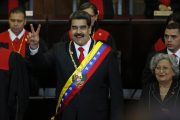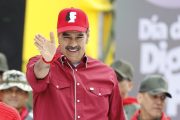
South American leaders invited to attend a special summit in the Bolivian city of Cochabamba released a joint statement on July 4 demanding an explanation and an apology from the governments of France, Italy, Portugal, and Spain, after the nations closed their airspace to the plane carrying Bolivia’s President Evo Morales (shown in front) two days earlier. Officials in the four nations had suspected that NSA whistleblower Edward Snowden was on board Morales’ plane.
Following a 14-hour layover in Vienna, Austria, Morales continued on to Bolivia — where he received an enthusiastic welcome at the La Paz airport on Wednesday night.
Morales was returning from a summit in Moscow, where, in an interview with Russia Today, he indicated that he would be willing to consider a request from Snowden for asylum in Bolivia. However, the Bolivian leader said he never saw Snowden in Moscow, and that Bolivia has not received a formal request for asylum for him. Snowden is believed to be waiting in the transit area of Moscow’s Sheremetyevo International Airport, pending approval of his asylum request from one of 20 countries he has applied to.
“United we will defeat American imperialism. We met with the leaders of my party and they asked us for several measures and if necessary, we will close the embassy of the United States,” USA Today quoted Morales’ statement at the summit. “We do not need the embassy of the United States.”
The Indian newspaper The Hindu reported that Morales has blamed the U.S. government for pressuring European countries to refuse to allow his plane to fly through their airspace, describing this action as a violation of international law.
The U.K. Guardian and other sources reported that Spanish Foreign Minister José Manuel Garcia-Margallo said on Spanish National Television that Spain and other European countries were told that Snowden was aboard the Bolivian presidential plane, revealing that “they told us that the information was clear, that he was inside.”
Garcia-Margallo did not say who supplied the information and declined to say whether he had been in contact with the United States. However, he did say that the European countries’ actions with regard to the Bolivian presidential plane were based on this information.
He was joined in the special summit by the leaders of Argentina, Ecuador, Suriname, Venezuela, and Uruguay. Among those were Argentina’s President Cristina Fernandez, who said: “One thinks of the developed nations who invest so much money in their intelligence and security apparatuses and then all of a sudden, these very security agencies wrongly informed their governments. Evidently, they informed them that inside President Morale’s plane was a person who was exercising his right to asylum.”
The Hindu quoted a statement made at the Cochabamba summit by Ecuadorean President Rafael Correa, who said that he and the other leaders were giving their full support to Morales following the rerouting of the plane, describing it as an aggression against the Americas. “We’re not going to accept that in the 21st century there’s first, second and third rate countries,” said Correa. “The leaders and authorities in Europe have to take a lesson in history and understand that we’re not 500 years behind. This Latin America of the 21st century is independent, dignified and sovereign.”
Speaking at a rally at a Cochabamba sports arena ahead of the summit, Venezuelan President Nicolas Maduro criticized alleged attempts by Spanish officials to search the plane of Morales — and also accused the CIA of pressuring several European countries to deny the Bolivian presidential plane their airspace. “A minister of one of those European governments told me personally that it was the CIA who gave the order to the aeronautical authorities, the one who gave the alert that Snowden was on the plane,” said Correa. “The CIA is more powerful than governments.”
Considering that Maduro is the successor to Venezuela strongman Hugo Chávez, many in the West might take his words with a grain of salt, but his statement nevertheless raises important points.
The Christian Science Monitor, in a report, quoted Coletta Youngers, identified as a senior fellow at the Washington Office on Latin America, an NGO. “A diplomatic plane with a president on board, diverted from its route and then searched — it is precisely the kind of mistreatment that the Bolivian government has rejected in its bilateral relations with the United States,” said Youngers. “This would not happen to President Obama’s plane; why should diplomatic protocol be shunned for President Morales?”
The Monitor noted that none of the nations to which Snowden has applied has yet approved his request for asylum, though it is still being considered by Venezuela and Bolivia.
Snowden has said that his preferred country in which to take up residency would be Iceland, describing the country as one that has “stood up for people over internet freedom.”
Snowden, a former employee of a National Security Agency (NSA) contractor, Booz Allen Hamilton, first came to public attention when his leaked information about the National Security Agency’s secret monitoring of the Internet and collection of our telephone logs was made public. Snowden worked extensively with Glenn Greenwald of the British Guardian, which published a series of exposés based on Snowden’s disclosures in June 2013.
When Greenwald asked him what the leaked documents reveal, Snowden replied:
That the NSA routinely lies in response to congressional inquiries about the scope of surveillance in America. I believe that when [Senator Ron] Wyden and [Senator Mark] Udall asked about the scale of this, they [the NSA] said it did not have the tools to provide an answer. We do have the tools and I have maps showing where people have been scrutinized most. We collect more digital communications from America than we do from the Russians.
When Greenwald asked Snowden why he decied to become a whistleblower, he answered:
The NSA has built an infrastructure that allows it to intercept almost everything. With this capability, the vast majority of human communications are automatically ingested without targeting. If I wanted to see your emails or your wife’s phone, all I have to do is use intercepts. I can get your emails, passwords, phone records, credit cards.
I don’t want to live in a society that does these sort of things.… I do not want to live in a world where everything I do and say is recorded. That is not something I am willing to support or live under.
Snowden left Hawaii for Hong Kong on May 20 and traveled to Moscow on June 23.
On June 14, U.S. federal prosecutors charged Snowden with espionage and theft of government property.
Related articles:
Snowden Headed to Ecuador for Asylum?
Fox News Focuses on Snowden, Ignores Gov’t Assault on Bill of Rights
The Predictable Response to Edward Snowden’s Disclosure of PRISM




